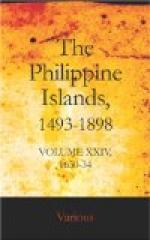Father Fray Hernando de Cabrera, an admirable minister of the Tagalos, of whom we have already spoken, asked for leave to go to Espana. Together with the father master, Fray Pedro Garcia, he took passage on the flagship “San Juan,” a new ship whose first voyage this was. Aboard it was Don Fernando de Silva, who had governed these islands, four procurators for the city of Manila, who were being sent to look after the property of the citizens, on account of unfair dealings by those of Nueva Espana in the returns made for it [i.e., for goods exported thither from Manila]. Further, two fathers and a brother named Fray Juan de Pena took passage with them. Two of our religious embarked aboard the almiranta—father Fray Lorenzo [sic] de Figueroa as procurator of the creole fathers, and a brother named Fray Francisco de San Nicolas. They left the port of Cavite, August 4; they experienced considerable suffering, for the vendavals were blowing vigorously, and those winds make it difficult to get out of the bay. At last it was God’s good pleasure to give them weather which enabled them to make their voyage. In this line, on the return trip to Mejico, the ships do not sail in company, but each one takes the direction which is most expedient for it, relying on God, who will aid them. The storms were frightful. The almiranta suffered the most terrible voyage that ever ship has suffered. For after a few blasts they had to cut down the mast, and, when they reached thirty-six degrees, they lost their rudder. In such plight they agreed to return, suffering destructive hurricanes, so that, had not the ship been so staunch, it would have been swallowed up in the sea a thousand times. Finally God was pleased to have it return, as if by a miracle; and as such was it considered by all the inhabitants of Manila. The other vessel, being a new and larger ship, on perceiving the storm, went to a lower latitude. It continued to plow the sea, to the great discomfort of all, for it was six months on the voyage. The father master, Fray Pedro, died on that voyage, with so excellent an example that there was no one aboard the ship who was not edified. Father Cabrera also died with great piety, and like a devoted religious, as he was. The brother lived. Even the chaplain aboard the ship died. In all the dead numbered ninety-nine persons, who could have peopled a world. Those who arrived were in such condition that it was necessary to let them regain their strength in the port of Valdebanderas. The procurators on both sides had this lot, which was plainly that which occurred to all. But against the will of God there is no one who can go; what is important is, that His will be always done.




